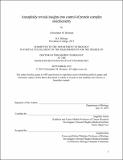Aneuploidy reveals insights into control of protein complex stoichiometry
Author(s)
Brennan, Christopher M.
Download1138012751-MIT.pdf (23.15Mb)
Other Contributors
Massachusetts Institute of Technology. Department of Biology.
Advisor
Angelika Amon.
Terms of use
Metadata
Show full item recordAbstract
Aneuploidy, or an incorrect number of chromosomes, is caused by errors in chromosome segregation during cell division. Because genes are expressed in accordance with their copy number, aneuploidy simultaneously alters the gene dosage of hundreds to thousands of genes. The outcome is an imbalanced proteome, which has a negative impact on cellular physiology and places intense demand on the protein quality control system of the cell to effectively fold and/or degrade proteins. Aneuploidy further represents an ideal model for studying how cells cope with imbalances in their proteome as it allows for interrogation of the fate of hundreds to thousands of imbalanced proteins simultaneously. Here, we identify protein complex stoichiometry imbalances as a major cause of protein aggregation in aneuploid cells. Subunits of protein complexes encoded on excess chromosomes aggregate in aneuploid cells, which is suppressed when expression of other subunits is coordinately altered. We further show that excess subunits are either degraded or aggregate, a fate that is largely mutually exclusive for individual subunits. We also demonstrate that protein aggregation is nearly as effective as protein degradation at lowering levels of excess proteins. Our study explains why proteotoxic stress is a universal feature of the aneuploid state and reveals protein aggregation as a form of dosage compensation to cope with disproportionate expression of protein complex subunits. This work informs both our comprehension of aneuploid cell physiology, and also provides a more complete understanding of how aneuploid and euploid cells cope with stoichiometric imbalances, namely that protein aggregation can function as protein quality control mechanism in this regard.
Description
This electronic version was submitted by the student author. The certified thesis is available in the Institute Archives and Special Collections. Thesis: Ph. D., Massachusetts Institute of Technology, Department of Biology, 2019 Cataloged from student-submitted PDF version of thesis. Includes bibliographical references.
Date issued
2019Department
Massachusetts Institute of Technology. Department of BiologyPublisher
Massachusetts Institute of Technology
Keywords
Biology.